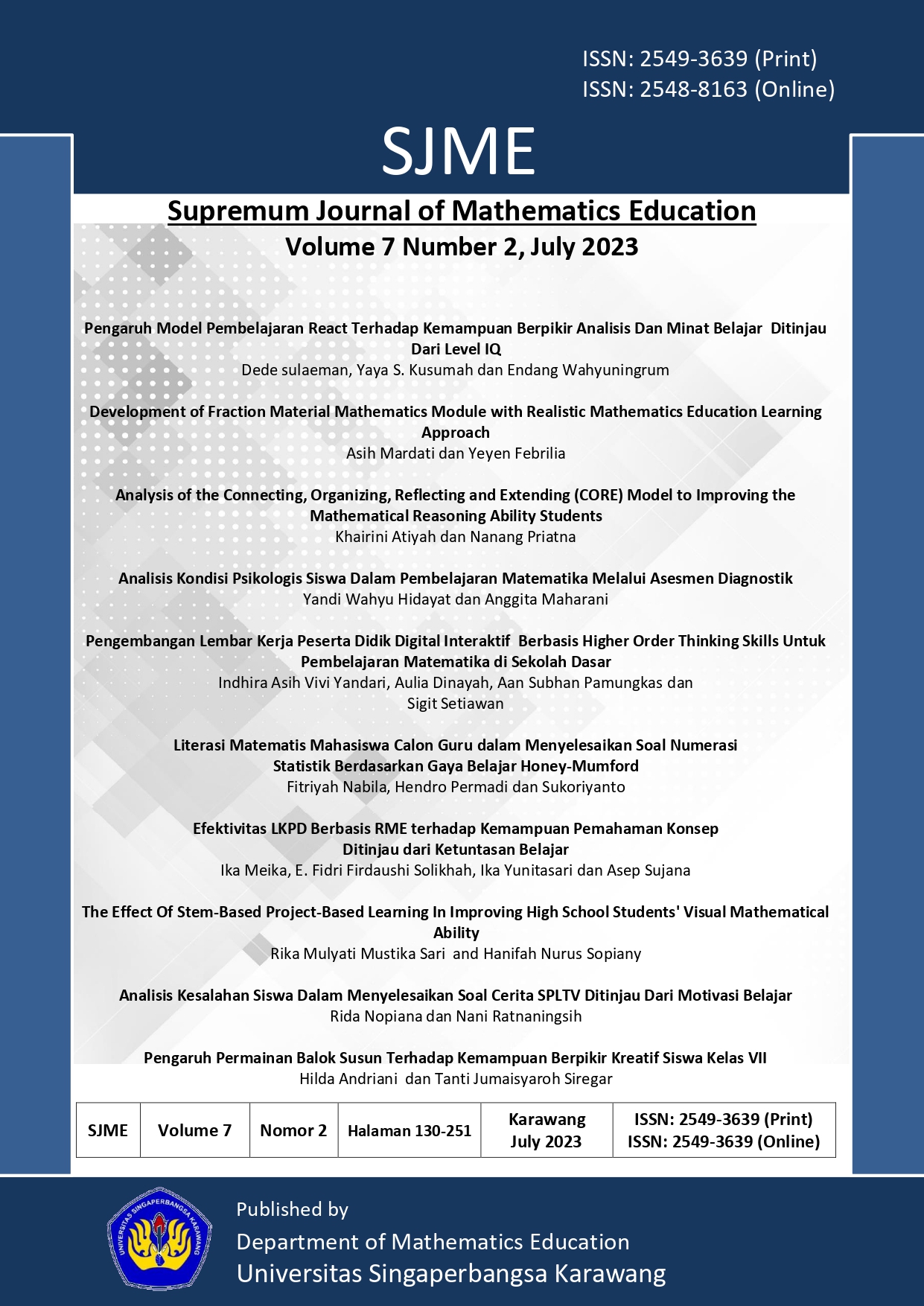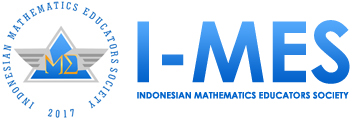Analisis Kondisi Psikologis Siswa Dalam Pembelajaran Matematika Melalui Asesmen Diagnostik
DOI:
https://doi.org/10.35706/sjme.v7i2.8761Abstract
This study aims to determine the psychological condition of students in learning mathematics. The psychological condition of students is important to know as a guide in preparing lesson plans. This research is a descriptive research with a quantitative approach. This study describes the results of the psychological analysis of SMA Negeri 1 Beber students which include: emotions, self-confidence, interest, and motivation. The subjects of this study were 30 students of Class XII IPS SMA Negeri 1 Beber. Based on the analysis of the results of the psychological questionnaire, it can be concluded that students' readiness in learning mathematics from the psychological aspect reaches 66% or is in the moderate category. The application of group study to the mathematics learning process can be used as an option by the teacher to be able to increase students' interest in learning. Giving project-based assignments can be given to reduce student boredom in working on math problems and to increase student experience in the learning process.
Downloads
References
Agustina, C. A., Rahayuningsih, S., Majapahit, U. I., & Gender, P. (2018). Analisis Keyakinan Diri ( Self Efficacy ) Siswa Sma Dalam Memecahkan Masalah Matematika Ditinjau Dari Perbedaan Gender. 1(September), 103–116.
Ali, T. (2020). Analisis Indikator Kegagalan Siswa Dalam Menempuh Pendidikan Di Sekolah. Jurnal Ilmiah Pendidikan Dan Pembelajaran(JIPP), Vol 4, No, 537–545. https://ejournal.undiksha.ac.id/index.php/JIPP/article/view/23989
Cahani, K., Effendi, K. N. S., & Munandar, D. R. (2021). Kemampuan Pemahaman Konsep Matematika Siswa Ditinjau Dari Konsentrasi Belajar Pada Materi Statistika Dasar. Jurnal Pembelajaran Matematika Inovatif, 4(1), 215–224. https://doi.org/10.22460/jpmi.v4i1.215-224
Cohen, L., Manion, L., & Morrison, K. (2017). Research methods in education. routledge.
Diana, P., Marethi, I., & Pamungkas, A. S. (2020). Kemampuan Pemahaman Konsep Matematis Siswa: Ditinjau dari Kategori Kecemasan Matematik. SJME (Supremum Journal of Mathematics Education), 4(1), 24. https://doi.org/10.35706/sjme.v4i1.2033
Dodi, N. (2016). Pentingnya guru untuk mempelajari psikologi pendidikan. Nusantara (Jurnal Ilmu Pengetahuan Sosial), 1, 59–63. http://jurnal.um-tapsel.ac.id/index.php/nusantara/article/view/93
Fimansyah, D. (2015). Pengaruh Strategi pembelajaran dan minat belajar terhadap hasil belajar matematika. Judika (Jurnal Pendidikan UNSIKA), 3(1).
Gunawan, I., Ulfatin, N., Sultoni, Sunandar, A., Kusumaningrum, D. E., & Triwiyanto, T. (2017). Pendampingan Penerapan Strategi Pembelajaran Inovatif dalam Implementasi Kurikulum 2013. Jurnal Abdimas Pedagogi, 1(1), 37–47. http://journal2.um.ac.id/index.php/pedagogi/article/view/1950/1139
Hajerina, H., Suciati, I., & Wahyuni, D. S. (2022). Profil Kemandirian Belajar Mahasiswa Pendidikan Matematika di Masa Pandemi Covid-19. SJME (Supremum Journal of Mathematics Education), 6(2), 123–137. https://doi.org/10.35706/sjme.v6i2.5796
Hendriana, H. (2012). Pembelajaran Matematika Humanis Dengan Metaphorical Thinking Untuk Meningkatkan Kepercayaan Diri Siswa. Infinity Journal, 1(1), 90. https://doi.org/10.22460/infinity.v1i1.9
Heritage, M. (2013). Gathering evidence of student understanding. SAGE Handbook of Research on Classroom Assessment, 179–195.
Jampel, I. N. (2016). Analisis Motivasi Dan Gaya Belajar Siswa Dalam Pembelajaran Di Sekolah Dasar. Jurnal Pendidikan Dan Pengajaran, 49(3), 109. https://doi.org/10.23887/jppundiksha.v49i3.9015
Journal, L. (2017). Lantanida Journal,. 5(2).
Khotimah, H. (2020). Faktor-Faktor Yang Memengaruhi Belajar Matematika. De Fermat : Jurnal Pendidikan Matematika, 2(2), 116–123. https://doi.org/10.36277/defermat.v2i2.56
Komalawati, R. (2020). Manajemen Pelaksanaan Tes Diagnostik Awal Di Sekolah Dasar Pasca Belajar Dari Rumah Untuk Mengidentifikasi Learning Loss. Jurnal Edupena, 1(2), 135–148.
McTighe, J., Wiggins, G., Warso, A. W. D. D., Zahroh, S. H., Parno, Mufti, N., & Anggraena, Y. (2017). Pembelajaran dan Penilain. Seminar Pendidikan IPA Pascasarjana UM, 123.
Mulyana, A., Senajaya, A. J., & Ismunandar, D. (2021). Indikator-Indikator Kecemasan Belajar Matematika Daring Di Era Pandemik Covid- 19 Menurut Perspektif Siswa Sma Kelas X. Proximal: Jurnal Penelitian Matematika Dan Pendidikan Matematika, 4(1), 14–22. https://doi.org/10.30605/proximal.v4i1.501
Ninomiya, S. (2016). The Possibilities and Limitations of Assessment for Learning: Exploring the Theory of Formative Assessment and the Notion of “Closing the Learning Gap” Educational Studies in Japan, 10(0), 79–91. https://doi.org/10.7571/esjkyoiku.10.79
Nurdiana, S. (2017). Psikologi Dan Pembelajaran Matematika. Pendidikan Dan Kependidikan, 2(1), 70–83.
Pradika, L., & Syamsuri, S. (2019). Pengaruh Diskusi Kelompok Dalam Pembelajaran Matematika Terhadap Sikap Dan Hasil Belajar Siswa Smp Di Kota Serang. TIRTAMATH: Jurnal Penelitian Dan Pengajaran Matematika, 1(1), 47. https://doi.org/10.48181/tirtamath.v1i1.6886
Rozikin, S., Amir, H., & Rohiat, S. (2018). Hubungan Minat Belajar Siswa Dengan Prestasi Belajar Siswa Pada Mata Pelajaran Kimia Di Sma Negeri 1 Tebat Karai Dan Sma Negeri 1 Kabupaten Kepahiang. Alotrop, 2(1), 78–81. https://doi.org/10.33369/atp.v2i1.4740
Safarati, N. (2023). Literature Review: Pembelajaran Berdiferensiasi Di Sekolah Menengah. Literature Review, 6(November), 33–37.
Sani, R. A. (2022). Penilaian Autentik. Bumi Aksara. https://books.google.co.id/books?id=Q11mEAAAQBAJ
Sardiman, A. M. (2011). Pendidikan Karakter dan Peran Pemerintah. Yogyakarta. Makalah.
Sembiring, R. B., & . M. (2013). Strategi Pembelajaran Dan Minat Belajar Terhadap Hasil Belajar Matematika. Jurnal Teknologi Pendidikan (JTP), 6(2), 34–44. https://doi.org/10.24114/jtp.v6i2.4996
Sholihat, N. M., Effendi, K. N. S., & Haerudin, H. H. (2021). Pengaruh Minat Belajar Terhadap Kemampuan Komunikasi Matematis Siswa SMP Kelas VII. JP3M (Jurnal Penelitian Pendidikan Dan Pengajaran Matematika), 7(1), 1–8. https://doi.org/10.37058/jp3m.v7i1.1888
Silfitrah, S., & Mailili, W. H. (2020). Pengaruh Minat Belajar Dan Motivasi Belajar Terhadap Hasil Belajar Matematika Siswa Kelas Vii Smp Negeri 4 Sigi. Guru Tua : Jurnal Pendidikan Dan Pembelajaran, 3(1), 53–60. https://doi.org/10.31970/gurutua.v3i1.39
Utami, A. H., & Warmi, A. (2019). Analisis kesulitan belajar ditinjau dari rasa kecemasan matematika. Sesiomadika Journal, 617–622.
Vandini, I. (2016). Peran Kepercayaan Diri terhadap Prestasi Belajar Matematika Siswa. Formatif: Jurnal Ilmiah Pendidikan MIPA, 5(3), 210–219. https://doi.org/10.30998/formatif.v5i3.646
Wulan, D. R., Rosita, C. D., & Nopriana, T. (2021). Kondisi Psikologi Siswa SMP dalam Pembelajaran Matematika pada Masa Pandemi Covid-19. JNPM (Jurnal Nasional Pendidikan Matematika), 5(1), 51. https://doi.org/10.33603/jnpm.v5i1.4392
Yenni, Y., & Sukmawati, R. (2019). Analisis Kemampuan Berpikir Reflektif Matematis Berdasarkan Minat Belajar Pada Mata Kuliah Struktur Aljabar. Teorema: Teori Dan Riset Matematika, 4(2), 75. https://doi.org/10.25157/teorema.v4i2.2283
Downloads
Published
How to Cite
Issue
Section
License

This work is licensed under a Creative Commons Attribution-ShareAlike 4.0 International License.
Authors who publish with this journal agree to the following terms:
- Authors retain copyright and grant the journal right of first publication with the work simultaneously licensed under a Creative Commons Attribution License that allows others to share the work with an acknowledgment of the work's authorship and initial publication in this journal.
- Authors are able to enter into separate, additional contractual arrangements for the non-exclusive distribution of the journal's published version of the work (e.g., post it to an institutional repository or publish it in a book), with an acknowledgment of its initial publication in this journal.
- Authors are permitted and encouraged to post their work online (e.g., in institutional repositories or on their website) prior to and during the submission process, as it can lead to productive exchanges, as well as earlier and greater citation of published work (See The Effect of Open Access).











